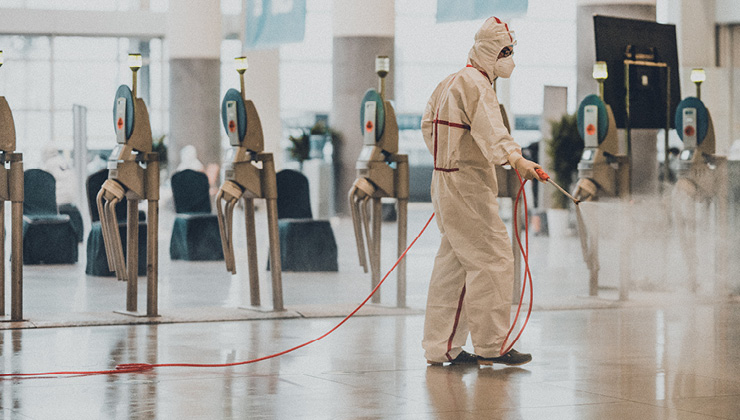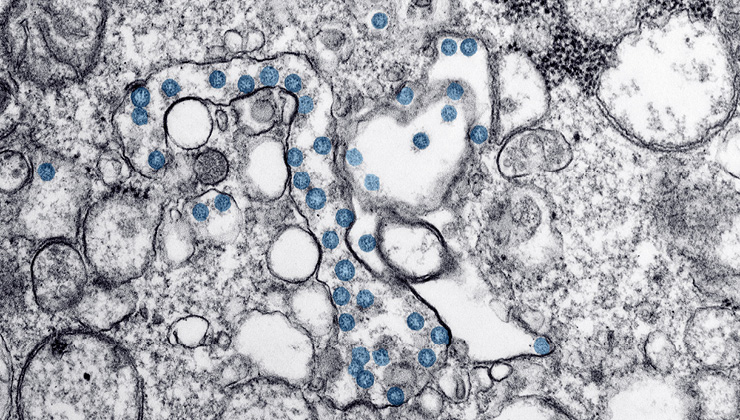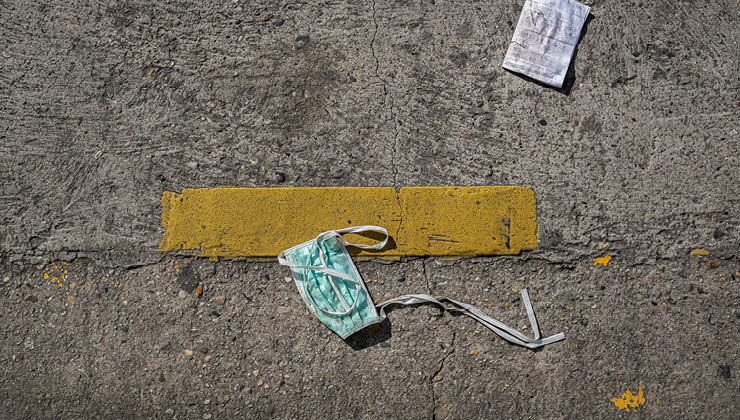As public interest in women’s leadership in response to COVID-19 grows, Noha Yehya of the Yemeni Women Union (YWU), and Michelle Spearing and Laura Martineau-Searle of SDDirect reflect on the roles of women in the COVID-19 response and draw lessons from Yemen to highlight the importance of women’s leadership at the grassroots in responding to the pandemic and the links to the women, peace and security agenda.
As confirmed cases of COVID-19 start to grow in Yemen, the World Health Organisation (WHO) and humanitarian experts foresee a ‘perfect storm’ with catastrophic consequences.
Yemen faced the world’s largest humanitarian crisis before COVID-19. Restricted humanitarian access due to conflict is now being compounded by lockdown restrictions and flight suspensions whilst the funding shortfall grows. This is deeply concerning, as we know from the recent cholera outbreak that it is easy for infectious diseases to spread in Yemen, given that most people live in crowded conditions, which makes social distancing impossible, whilst poor water, sanitation and hygiene provision makes it difficult for people to regularly wash their hands.
Furthermore, five years of conflict have destroyed the public health system with over 50% of health facilities destroyed, many through deliberately targeted attacks which remain a risk despite an agreed ceasefire. Should people fall seriously ill, there are very few places they can go to seek medical assistance and the risk of attack acts as a deterrent to seeking help. At the same time women and girls face specific barriers to accessing the limited health facilities that are available. They may require permission of male family members to attend a health facility, they may not feel safe to walk without male escort, and they may be further deterred by police or military engagement in providing health-care responses to COVID-19.
Yemeni women are already at the forefront of responding to acute humanitarian needs, often alongside peacebuilding activities, and COVID-19 presents additional demands and risks.
Women-led organisations like the Yemeni Women’s Union (YWU) are responding to the needs of communities, and specifically the needs of women and girls affected by both the conflict and the pandemic. Mirroring global patterns, in Yemen women constitute the majority of health care workers and bear the burden of caring for the sick within families and communities. With 75% of the Yemeni population dependent on humanitarian assistance for their day-to-day survival these efforts of Yemeni women are lifesaving given the withdrawal of many international organisations from Yemen due to the COVID-19 outbreak and restrictions imposed. However, COVID-19 presents additional burdens and high risks for Yemeni women in performing these roles. It is essential that Yemeni women have the tools, services, funding and freedoms that they need to respond effectively and safely. Women and girls in Yemen already live with daily threats of violence, perpetrated inside and outside their homes and COVID-19 presents new drivers of this violence whilst reducing sources of support.
With 75% of the Yemeni population dependent on humanitarian assistance for their day-to-day survival these efforts of Yemeni women are lifesaving given the withdrawal of many international organisations from Yemen due to the COVID-19 outbreak and restrictions imposed
The restrictions of COVID-19 lockdown and quarantine, together with extreme economic stresses, have led to dramatic jumps in incidences of domestic violence in many countries and Yemen is no exception. Levels of domestic violence and sexual harassment of women in Yemen were historically high and were already estimated to have increased by 63% during the last five years due to the conflict, whilst other forms of violence against women and girls (VAWG) has also risen including early and forced marriage.
Since COVID-19 restrictions were imposed, YWU continues to record a similar number of cases of violence against women despite the reduced opportunities that many women have to report violence or access services, which is believed to indicate that levels of violence have risen further. The YWU is also providing legal and other support to girls forced to marry and has already encountered cases due to the current strain families are under. Shifting roles of security forces in imposing COVID-19 restrictions present further risks to women in countries like Yemen where there are few curbs on power and widespread impunity.
At the same time that rates of violence against women are rising in Yemen due to COVID-19, services to prevent violence and support survivors have reduced. Yemen was already experiencing a funding shortfall to support acute humanitarian needs. The demands of the COVID-19 response have already led to a diversion of funding away from services for women and girls. UNFPA estimates that without adequate funding, 48,000 women could die due to a lack of sexual and reproductive health services. The YWU is also concerned that measures intended to curb the spread of the virus, such as restrictions on freedom of movement, further limit women and girls’ access to services that are ongoing, including those provided by YWU.
At the same time that rates of violence against women are rising in Yemen due to COVID-19, services to prevent violence and support survivors have reduced. Yemen was already experiencing a funding shortfall to support acute humanitarian needs
As infection rates pick up in Yemen, it is crucial that the prevention and redress of violence against women is a key part of COVID-19 response and that the leadership of Yemeni women in responding is supported.
YWU are adapting their work to help respond to the COVID-19 outbreak. For example, they are using women and girls safe spaces to train women and girls on how to produce face masks and hand sanitisers, which they can then distribute in their communities. They are also using hotline and tele-counselling services which women and girls can call for advice if they are at risk of/or experiencing violence, or even seeking psychological support, legal aid, or referral, as physical access to YWU branches may be restricted during the outbreak.
One of the challenges with this approach, however, is that many women and girls in Yemen do not have access to a mobile phone or do not have the privacy to make a call safely, which will of course limit their ability to benefit from the service. However, with resources stretched globally in the COVID-19 response, finding the resources needed to support women leading and delivering these services is more challenging than ever, whether this be providing flexible financing, technical advice or facilitating space for Yemeni women to influence wider decision making on the COVID-19 response at national level and amongst the international community who can mobilise resources.
Bringing emerging evidence from Yemeni women to global discussions is key to shaping the humanitarian response in Yemen that both responds to the specific needs of Yemeni women and girls at this time and works with those best placed to provide support.
The results of a recent review of evidence on how the conflict in Yemen has affected different forms of VAWG and how COVID-19 may be further impacting on this was recently presented to UN Security Council members. There is little documentation of the impact of COVID-19 on VAWG in Yemen, reflecting the difficulty of conducting research during conflict and crisis, the specific challenges around collecting data on VAWG during COVID-19 and the general under-reporting of all forms of VAWG in Yemen due to fear, stigma and lack of services through which women can report or expect support. However, the YWU were able to provide information on trends being seen, drivers and responses of individual women, families and communities because they are on the ground providing services, adapting and responding to the changing challenges facing women and girls across all governorates of Yemen.
YWU were able to provide information on trends being seen, drivers and responses of individual women, families and communities because they are on the ground providing services, adapting and responding to the changing challenges facing women and girls across all governorates of Yemen
Members of the YWU continue to fight for a woman’s right to live a life free from violence, knowing that freedom from the threat of violence is a pre-requisite for women’s fuller contributions to the development of their country. Women’s work as humanitarian responders earns them respect and the trust of their communities, which in the process may open doors to them as peacebuilders so that they can help bring an end to the conflict. They hold hope that one day a woman can lead Yemen again – just as Bilqis, the Queen of Sheba, did long ago.
As the 20th anniversary of United Nations Security Council Resolution 1325 approaches amidst the COVID-19 global health emergency, UNSCR 1325 and the Women, Peace and Security agenda is every bit as important in Yemen now as it was twenty years ago.
As interest in the roles of women leaders grows during the COVID-19 response so do debates around the meaning of feminist leadership and its potential in shaping a different way of doing politics and implementing policy. Renewed commitment to fully realising the Women, Peace and Security agenda can help harness the power of all women leaders, from heads of state to those working in their communities, as part of the COVID-19 response, ensuring that women’s participation is meaningful and able to influence key responses.
Now, more than ever before, grassroot organisations like the YWU need the support of the international community. From the perspective of YWU members, there is hope that if the international community works with them, listens to them, funds them and helps them develop capacity, then together we might save many lives as humanitarian responders.
A version of this blog was originally published by Social Development Direct as part of their COVID-19 Blog Series.
As part of SDDirect’s support for grassroots organisations and women peacebuilders it runs the Gender-based Violence Area of Responsibility helpdesk, a free of charge research and technical advice service funded by UNICEF which aims to inspire and support a range of humanitarian actors to prevent and respond to GBV in emergencies, including women-led organisations in countries affected by conflict such as Yemen.
The views, thoughts and opinions expressed in this blog post are those of the author(s) only, and do not necessarily reflect LSE’s or those of the LSE Centre for Women, Peace and Security.





